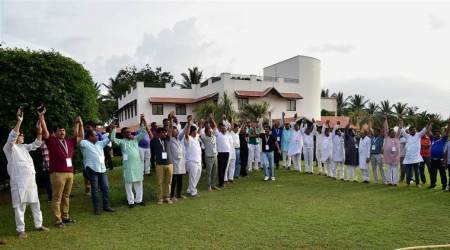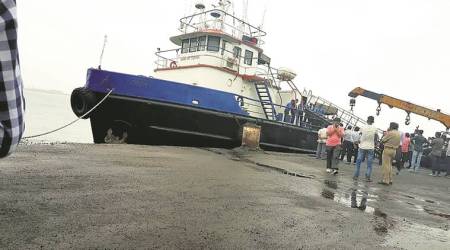 The petitioner alleged that Chatterjee manipulated the ACRs and the reporting system in such a way that other officers being considered in the same promotion board as his son-in-law stood at a disadvantage.
The petitioner alleged that Chatterjee manipulated the ACRs and the reporting system in such a way that other officers being considered in the same promotion board as his son-in-law stood at a disadvantage.
THE PRINCIPAL bench of the Armed Forces Tribunal (AFT) has ruled against a Vice Admiral, who was accused of favouring his son-in-law while downgrading other officers in their Annual Confidential Reports (ACRs). The bench also ordered Vice Admiral P K Chatterjee to pay Rs 5 lakh as compensation to the petitioner, Commander S S Luthra, who has since retired. The bench said that although Luthra had taken premature retirement after being passed over for promotion, he must be considered for the rank of Commander.
Pulling up the Navy, the bench of Justice Virender Singh, chairperson of the tribunal, and Lt Gen Sanjiv Langar said: “It is disturbing and surprising that the Indian Navy does not have an in-built system to ensure such probable occurrence between relatives is addressed institutionally, so that such a situation, as occurred in this case, does not manifest.”
In his petition, Luthra had alleged that he was systematically downgraded for promotion, although he was a highly-qualified Reactor Operator on the nuclear submarines inducted by the Indian Navy. His Senior Reviewing Officer (SRO), whose assessment/ marks are finally considered for promotion, was Vice Admiral Chatterjee, Inspector General Nuclear Safety (IGNS). From 2010 to 2012, Chatterjee was the SRO for officers serving on-board nuclear submarines INS Chakra and INS Arihant. He wrote the ACRs of these officers, which included his son-in-law Captain A V Agashe.
The petitioner alleged that Chatterjee manipulated the ACRs and the reporting system in such a way that other officers being considered in the same promotion board as his son-in-law stood at a disadvantage. Consequently, no Reactor Operator other than Agashe was promoted. Ruling in favour of the petitioner, the bench said it was a clear case of mala fide on the part of Chatterjee, and said he had consciously upgraded Agashe’s profile repeatedly, thereby benefiting him. The bench also noted that Chatterjee did not disclose that he was writing his son-in-law’s ACR.
Asking the Navy to consider Luthra for promotion to the rank of Captain and, if he makes the grade, to give him the benefits of the rank and pension, the bench said: “We find that possibly, as a consequence of his despondence with his circumstances and the system, he (Luthra), rather than serving superseded by others, has chosen to proceed on premature retirement. In doing so, while he may have exercised his personal choice, albeit in trying circumstances, however, on the contrary, the Indian Navy has lost a highly specialised officer, on whom admittedly a huge cost and time has been invested, for super specialisation in the complex domain of nuclear submarines. Such a loss to the Navy and consequently to the nation is disturbing.”
The bench added: “The Navy shall ensure that such circumstances, which are completely avoidable, do not occur, and in doing so, will specify orders and policies to ensure that there is no recurrence of such a possibility, which being unacceptable in any government department, in a service like Navy and Armed Forces of the Union, even a hint of such a convergence must never be allowed to manifest.”

